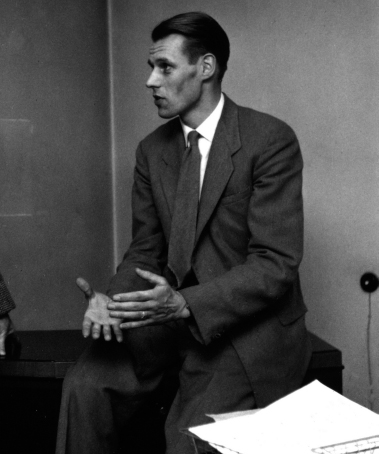![]()
THE FIFTH BEATLE
GEORGE MARTIN
He’d dealt with navigators and pilots. He could deal with us when we got out of line.
– Paul McCartney
George Henry Martin was born in Holloway, London, on 3 March 1926, the youngest child of carpenter Henry Martin and his wife Bertha. His parents were not musical, but there was a piano in the family home, and George took his first lessons when he was eight years old. Later, when he was evacuated to Bromley with his family as a teenager, he formed his own dance band, playing in local clubs and schools.
He left school with distinctions in French and maths and dreamt of designing aircraft. Instead, with the war on, he volunteered for the Fleet Air Arm in the Royal Navy, first being posted to Jamaica and then to New York where he enjoyed the jazz scene. He was promoted to officer, ironed out his accent, and continued to play piano.
After leaving the Navy, he auditioned for the Guildhall School of Music and was accepted. He studied there – playing piano and oboe – for three years, though he did not achieve a final examination pass. (His oboe teacher was one Margaret Eliot, mother of Jane Asher, who would later have a relationship with Paul throughout the sixties.)
After Guildhall, Martin took a clerical job in the BBC’s music library and continued to play the oboe in gigs across London. He was then offered the job of A&R assistant at Parlophone, an EMI subsidiary known for its more eclectic signings. By 1954, he headed up the label.
Here, he widened his musical palette working with every kind of music from around the world. He had successes in jazz with Humphrey Lyttelton (achieving his first number one hit, ‘You’re Driving Me Crazy’, with the novelty trad jazz outfit The Temperance Seven), in children’s music with ‘Nellie The Elephant’, in skiffle with The Vipers, in ballads with Matt Monro, and, most famously, in comedy with The Goons, Beyond the Fringe, Rolf Harris and Bernard Cribbins.

A dapper, dashing George Martin. Alamy
When Martin first heard The Beatles, he was far from impressed. By this time, Brian Epstein had visited Robert Boast at HMV (also owned by EMI), who transferred the Decca audition tape to vinyl and introduced him to Ardmore & Beechwood, a music publisher based in the HMV offices. They liked what they heard and were keen to sign the publishing rights for ‘Like Dreamers Do’. So, when Epstein turned up in Martin’s office, he anticipated a similar positive response. Their meeting was pleasant but Epstein left with no promises.
Martin’s indifference was overruled by his boss, the head of EMI Len Wood, and he was instructed to offer The Beatles a contract and bring the band in for a recording session on 6 June 1962. They brought two new songs to the session, ‘Love Me Do’ and ‘P.S. I Love You’, but despite already having secured a contract, performed nervously and tentatively. Martin, still unsure of his new signing, asked the group up to the control room to talk them through the production. Afterwards, he asked them if there was anything they didn’t like. George, in this moment of tension, quipped, ‘Well, for a start, I don’t like your tie.’ The control room collapsed into laughter, and Martin then succumbed to the full Beatle joshing experience, finally grasping exactly why the world would fall in love with them. Still, he did have reservations about their drummer, Pete Best.
In 1965, Martin left EMI to become a freelance producer. He started his own company, Associated Independent Recording (AIR) – though he was employed to continue working with The Beatles – and made more money than he did as an EMI employee. After The Beatles split up, he continued to work with a variety of musicians, including Jeff Beck, Elton John, Kenny Rogers, Pete Townshend and Celine Dion, and opened a studio in Montserrat, though it was later destroyed in a hurricane. He reunited with Paul to work on the glorious James Bond theme ‘Live And Let Die’, and produced three of Paul’s solo albums, Tug Of War, Pipes Of Peace and Give My Regards To Broad Street. As his hearing began to fail, he brought in his son, Giles, to help him with later Beatles projects, including the Las Vegas stage performance Love with Cirque du Soleil. George Martin died in his sleep, aged ninety, in 2016, leaving behind an extraordinary musical legacy.